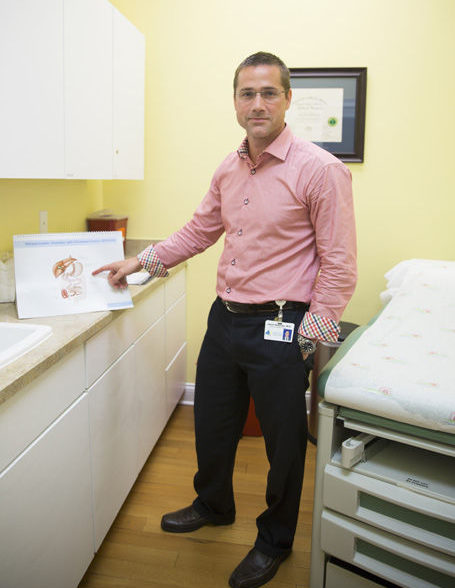
The landscape of diabetes treatment changed dramatically in April when the Cleveland Clinic released study results showing that, five years after treatment, 88 percent of type 2 diabetes patients were essentially cured by bariatric weight-loss surgery.
The study – entitled Surgical Treatment and Medications Potentially Eradicate Diabetes Efficiently – followed 150 men and women who before treatment had uncontrolled type 2 diabetes and a body mass index of between 27 and 43.
It compared the effects of the conventional diabetes treatment – insulin injections, diet control and exercise – to bariatric weight loss surgery over a five-year period.
Bariatric surgery won by a landslide.
“Over 88 percent of gastric bypass and sleeve gastrectomy patients maintained healthy blood glucose levels without the use of insulin,” the study concluded. At the same time, overall weight loss was “significantly greater” with bariatric surgery than with a diet and exercise regimen.
For Dr. Jason Radecke, a board certified general and bariatric surgeon at Riverside Surgical and Weight Loss Center and the vice-chairman of surgery at the Sebastian River Medical Center, the study only confirms what he already knew.
Radecke and his surgical partner, Dr. Patrick Domkowski, have performed more than 1,100 bariatric weight-loss procedures in the past several years and their meticulously documented findings mirror those of the Cleveland Clinic.
According to the gregarious Radecke, “there is a 70- to 90-percent chance” diabetes patients who undergo bariatric surgery will never have to take an insulin shot or pill again.
The American Diabetes Association, the International Diabetes Federation and more than 40 other national and international health groups have embraced the Cleveland Clinic’s findings.
Why?
Because traditional diabetes treatments simply aren’t working well enough. Fully half of all patients currently being treated for type 2 diabetes with exercise and medication alone are not meeting standard targets of glycemic control.
Type 2 diabetes afflicts upwards of 29 million Americans. It can lead to heart attacks, strokes, kidney failure, amputations and blindness, and it claims over 70,000 lives in this country each year.
The financial damage done by the disease is almost as daunting.
More than $245 billion, says the American Diabetes Association, is spent annually on diabetes treatments including $105 billion on hospital in-patient care and more than $44 billion on prescription medications. Diabetic supplies, lost work hours and doctors’ office visits make up the bulk of the remaining dollars spent.
Worse, says the ADA, those costs have risen by more than 40 percent over the past five years and show no signs of slowing down.
A year before this latest study was released, the Wall Street Journal wrote that “a growing body of evidence suggests that weight-loss surgery is more effective than diet and exercise at getting rid of Type 2 diabetes.”
Now there is solid proof the publication was correct.
Not everyone who has diabetes is – or should be – a candidate for bariatric surgery, but anyone with diabetes and a body mass index between 27 and 43 should, at the very least, meet with a physician to discuss available options.
There are several forms of weight loss surgery and Radecke is quick to name his favorite.
“The numbers support that gastric bypass duodenal switches are the best, with 80- to 90-percent complete resolution of diabetes,” he says. “The gastric sleeve follows very shortly, with a 70- to 75-percent” rate of success.
Both surgeries are done laparoscopically, Radecke says. “They’re small incisions with minimal pain.”
Radecke says today’s bariatric surgeons have learned from their predecessors and have dramatically reduced the risks involved in all types bariatric surgery. He joins with the American Diabetes Association in citing the price diabetes extracts from the nation’s economy each year.
“That disease costs taxpayers so much money,” exclaims Radecke. “It is just insane. From human dialysis to the kidney failures, to the neuropathies, to the pains, the eyes, the kidneys . . . It’s [often] worse than cancers . . . It’s so hard to control. Now are you telling me I can do a surgery that takes an hour, an hour and a half? Two days in the hospital? That’s it? Minimal pain, laparoscopic and you’re going to give me an 80-percent cure for this major disease?”
The New England Journal of Medicine joins the chorus by stating, “Gastric bypass and sleeve gastrectomy were superior to intensive medical therapy alone in achieving glycemic control and reducing cardiovascular risk factors while decreasing dependency on pharmacotherapy for diabetes management.”
The National Heart, Lung and Blood Institute at the National Institutes of Health has a free, easy-to-use body mass index calculator online at http://www.nhlbi.nih.gov/health/educational/lose_wt/BMI/bmicalc.htm.
Dr. Jason Radecke is with Riverside Surgical & Weight Loss Center and the Sebastian River Medical Center. His office is at 14430 U.S. Hwy. 1 in Sebastian. The phone is 772-581-8003.



